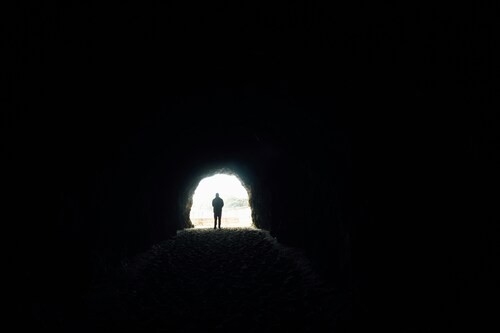February 19th, 2025
by Jacob Hancock
by Jacob Hancock
The End of the Beginning
by Jacob Hancock

This week we ended the book of Genesis. It’s a very special ending: the first
ending of the first book. Let’s look at the final two chapters in order to understand what
the end of Genesis means for the beginning of Exodus and the beginning of Luke’s
Gospel.
Siblings are really interesting. I have two, and our differences have always
fascinated me. We grew up in the same household with the same two parents, but each
of us is so wildly different. We have a “character” and because we have a character, there
are certain actions that would be in or out of character. For example, if I suddenly
developed a passion for creating football plays, that would be “out of character.” For
Brandt? Not so much. I think Jacob’s 12 sons operated in a very similar way—each with
their own unique character—and I think by understanding that, we can better
understand what the final two chapters of Genesis mean.
Genesis 49 shows us a dying Jacob giving a series of “blessings” to each of his 12
sons and their descendants. Not all of these “blessings” are created equal however.
Judah and Joseph’s children are blessed with power and rewarded beyond their wildest
dreams while Simeon and Levi’s children will be scattered. Why the disparity? To
answer that we need to look at the final chapter. Genesis 50 tells the story of Jacob’s
burial and its aftermath. After the brothers bury their father at Machpelah, they are
fearful that Joseph will take his revenge for selling him into slavery. However, Joseph
shows his good character by comforting his brothers, saying: “You meant evil against
me, but God meant it for good.”
Okay, but just because Joseph was a good guy doesn’t mean all his children will
be; why should they get rewarded for what he did? Well, if Joseph has a good general
character, then he’s probably a good father, and if he’s a good father, he’s probably
passing down good character traits to his children. Those children pass down those
traits and so on and so forth. The same can be said for Simeon and Levi; their evil and
violent nature would likely pass down.
So, all of Simeon and Levi’s children are destined to be evil? No. Moses was a
descendant of Levi, and he led the Hebrews out of Egypt. The prophecy that Jacob gives
his sons is good in so far as it is a prediction based on the behavior of each son, but
Jacob is not omniscient. There is someone who is though: God.
Moses was not raised by his own people. He was saved from the Pharoah’s
genocide against the Hebrews by God and was raised in the Pharaoh’s house. He was
just as much a “Levite” as he was the Pharaoh's grandson, but above all of these things
he was a child of God destined to lead the Hebrews to freedom in Exodus.
We see a similar story echoed in the first few chapters of Luke with the birth and
childhood of Jesus. Jesus is born into the lineage of Judah who, as Jacob predicted,
would be the tribe of great rulers. Twelve years after his birth, Jesus and his parents go
to Jerusalem, and Joseph and Mary lose their son. They find him three days later in the
temple where he says, “Why were you looking for me? Did you not know that I must be
in my Father's house?” Jesus knows his true father is God and his true destiny is to free
all believers from sin.
As children we naturally inherit a number of things from our parents, some good
and some bad. However, God gives us the opportunity to let something other than our
lineage define us: Him. We don’t have to walk in the same sins of our ancestors because
we are welcomed into a new family with God.
These articles supplement our church wide reading plan. To read the bible with us click here.
ending of the first book. Let’s look at the final two chapters in order to understand what
the end of Genesis means for the beginning of Exodus and the beginning of Luke’s
Gospel.
Siblings are really interesting. I have two, and our differences have always
fascinated me. We grew up in the same household with the same two parents, but each
of us is so wildly different. We have a “character” and because we have a character, there
are certain actions that would be in or out of character. For example, if I suddenly
developed a passion for creating football plays, that would be “out of character.” For
Brandt? Not so much. I think Jacob’s 12 sons operated in a very similar way—each with
their own unique character—and I think by understanding that, we can better
understand what the final two chapters of Genesis mean.
Genesis 49 shows us a dying Jacob giving a series of “blessings” to each of his 12
sons and their descendants. Not all of these “blessings” are created equal however.
Judah and Joseph’s children are blessed with power and rewarded beyond their wildest
dreams while Simeon and Levi’s children will be scattered. Why the disparity? To
answer that we need to look at the final chapter. Genesis 50 tells the story of Jacob’s
burial and its aftermath. After the brothers bury their father at Machpelah, they are
fearful that Joseph will take his revenge for selling him into slavery. However, Joseph
shows his good character by comforting his brothers, saying: “You meant evil against
me, but God meant it for good.”
Okay, but just because Joseph was a good guy doesn’t mean all his children will
be; why should they get rewarded for what he did? Well, if Joseph has a good general
character, then he’s probably a good father, and if he’s a good father, he’s probably
passing down good character traits to his children. Those children pass down those
traits and so on and so forth. The same can be said for Simeon and Levi; their evil and
violent nature would likely pass down.
So, all of Simeon and Levi’s children are destined to be evil? No. Moses was a
descendant of Levi, and he led the Hebrews out of Egypt. The prophecy that Jacob gives
his sons is good in so far as it is a prediction based on the behavior of each son, but
Jacob is not omniscient. There is someone who is though: God.
Moses was not raised by his own people. He was saved from the Pharoah’s
genocide against the Hebrews by God and was raised in the Pharaoh’s house. He was
just as much a “Levite” as he was the Pharaoh's grandson, but above all of these things
he was a child of God destined to lead the Hebrews to freedom in Exodus.
We see a similar story echoed in the first few chapters of Luke with the birth and
childhood of Jesus. Jesus is born into the lineage of Judah who, as Jacob predicted,
would be the tribe of great rulers. Twelve years after his birth, Jesus and his parents go
to Jerusalem, and Joseph and Mary lose their son. They find him three days later in the
temple where he says, “Why were you looking for me? Did you not know that I must be
in my Father's house?” Jesus knows his true father is God and his true destiny is to free
all believers from sin.
As children we naturally inherit a number of things from our parents, some good
and some bad. However, God gives us the opportunity to let something other than our
lineage define us: Him. We don’t have to walk in the same sins of our ancestors because
we are welcomed into a new family with God.
These articles supplement our church wide reading plan. To read the bible with us click here.

More from the blog:
Love Your Neighbor As Yourself
February 23rd, 2026
The Law of Leviticus boils down to this, and Jesus’ explanation and interpretation of the new covenant also has it at its core: Love your neighbor as yourself. This command in the 19th chapter of Leviticus is cited in three of the four Gospels as Jesus reiterates to the Jews the most important commandment - for it sums up the Law. But what I find interesting is that Jesus doesn’t seem to be tellin...
Finding the Right Foundation for Your Life
February 16th, 2026
Foundations are important. My husband and I discovered this first-hand when we were looking for our first house. The real estate agent took us to a “bargain” fixer-upper property with foundation problems. When we stepped into the house, we quickly saw that the foundation problems were indeed serious. Many of the floors were visibly slanted. Some of the doors were difficult to open. And when I plac...
Sojourners in the Flesh
February 9th, 2026
“This world is not my home, I’m just ‘a passing through.” These words open a lesser known hymn of the early 1900’s, and it seems like the sons of Jacob, and Jacob himself, echo this refrain. As the 70 persons of Jacob’s family come into Egypt, they do so as sojourners. When Pharaoh asks them what their job is, they reply, as instructed by Joseph, “Shepherds.” They go on to say, “We’ve come to sojo...
Recent
Archive
2026
2025
February
March
April
September
October
November
2024
March
April
September
October
2023
April
May
July
August
September



No Comments